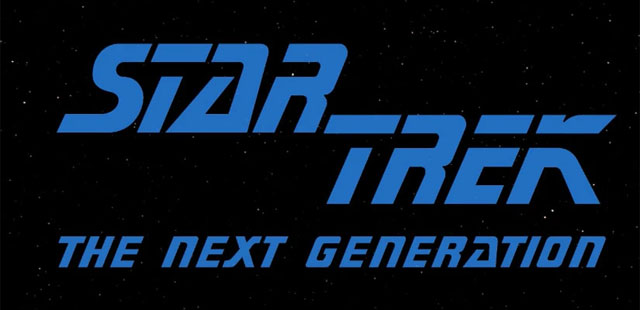
Palmer’s Trek: the final frontier. These are the voyages of Agent Palmer. On his continuing mission: to explore star trek. To seek out television series and movies. To boldly go where many fans have gone before!
The Next Generation Never Gets Where It Was Boldly Going
Set approximately 100 years after the original adventures of Captain Kirk and his crew, Star Trek: The Next Generation is on its own mission to boldly go to new places with Captain Jean-Luc Picard at the helm of his own crew aboard another Starfleet flagship.
The show is both derivative and unique; I liked it, but I didn’t fall in love with it as I had so easily with Star Trek: The Original Series. Let me state now, however, that to some extent the original series must have influenced my enjoyment of The Next Generation.
I wanted to love The Next Generation, but all I did was like it, which is OK! A month after I watched the finale of the series, I was still trying to get a handle on my thoughts. This is uncommon. Even when I’m reading books I’m not quite sure about, it still only takes me a week at most to sort out my feelings.
When I look back through my notes, the series started out strong using my own metric of episodes that were most striking to me. The breakdown of my personal standout episodes by season is four episodes each in seasons one and two, six episodes each in seasons three and four, three episodes in season five, four episodes in season six, and three episodes in season seven.
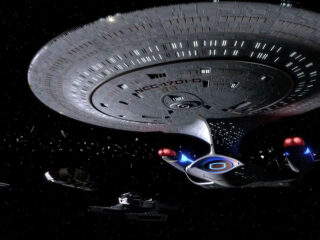
Personally, I prefer the former, though I don’t think that’s why I enjoyed it more. I just think there were too many missed opportunities. Now, spoilers ahead, but I do think that the death of Tasha Yar, towards the end of Season One, set some very high stakes that just weren’t followed through.
With Yar being the exception, everyone else is never really in danger, or at least, never seems to be in grave danger for the rest of the series. That’s literally six more seasons where none of the main cast are really in jeopardy. Occasionally someone is stranded or someone gets hurt, but you never really feel any true stakes that someone is actually in grave danger.
When you compare this to the Original Series, where there aren’t really any true character arcs, this lack of death is a missed opportunity. Is it possible that the longevity of the series matters when considering how we feel about it? Perhaps, The Original Series benefitted from being much shorter and therefore never got stale on me, but we’ll never truly know.
There’s also the argument to be made that the television of the era greatly impacted each show. The Original Series was groundbreaking in many ways that TNG just wasn’t.
By comparison on that account, The Next Generation wasn’t just the next iteration of the franchise. It was also a product of the one-hour dramas on television at the time it was produced and aired.
Meanwhile, as I page through my notes, (yes, I do take notes), I seem to gravitate towards throwback episodes, or at least episodes that remind me of that original series spirit – doing more with less, being more imaginative, or just going all in.
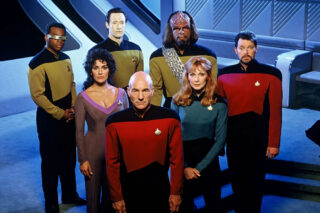
The slight universe building involves key nods to the original. There’s a pilot appearance from McCoy, early episode references to previous adventures from “that other Enterprise,” expansions that include Spock and Spock’s father Sarek, and much later a surprise from Scotty. The computer itself is still voiced by Majel Barrett Roddenberry, a nice touch and connection point between the two series.
Again, this could also be a product of the television of the time, but given the number of episodes, especially when compared with the original series, The Next Generation doesn’t seem to take quite as many chances. When they do, they really make it land.
First let me say that while the holodeck can be a boon for some very interesting storylines – Captain Picard and Dixon Hill, Data and his Sherlock Holmes infatuation, and a Robin Hood spinoff where Worf doesn’t “feel like a merry man,” to name a few – it does feel like a crutch to any actual exploration.
Perhaps that’s just my perception because, to reiterate, there is a lot more raw material with The Next Generation as compared to The Original Series. The new life they are supposed to seek out, however, seems less important to the mythos of The Next Generation than furthering the bureaucracy and politics of Starfleet.
I personally gravitated towards enjoying more of the throwback episodes. In conversations with friends my age who grew up with TNG, I found myself being only so-so on some of their favorite memories, though a few of the episodes shine through no matter what.
I’m not talking about episodes that feel more like the Original Series such as Attached (S7E8), Liaisons (S7E2), and Who Watches The Watchers (S3E4). Nor am I talking about some of the more Twilight Zone-y episodes like Remember Me (S4E5) or Night Terrors (S4E17). I’m talking about episodes that are just a step above the rest.
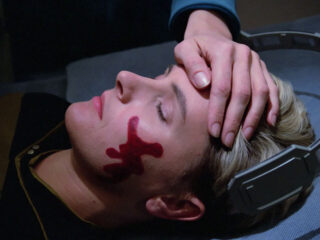
The other thing about the death of Tasha Yar is that it is entirely unexpected. As a viewer, you’re nearing the end of the first season of a show you have come to enjoy and a crew you are finally familiar with, and then BOOM, somebody is permanently and irreversibly gone.
At this point, I was excited for the bold choice. Sadly, the truth of the matter is less bold, but again, this could be more of a result of the television of the time. Characters just weren’t killed off, not for ratings or plot, only for contract negotiations gone bad.
Still, watching it after 2020 and all that has come since, it feels like a large missed opportunity that they only took because an actor wanted off the show.
The next episode that acquired a lot of accolades was Darmok, the second episode of Season Five. This episode is all about communication. “Darmok and Jalad at Tanagra” means absolutely nothing to Captain Picard as he is stranded on a planet with an alien and no universal translator or technology.
Through hand signals and the repetition of “Darmok and Jalad at Tanagra,” the phrase comes to make sense to Picard and his alien companion in what can only be described as a masterclass for how we can communicate across cultural and language barriers.
Meanwhile, Season Seven’s 15th episode “Lower Decks” features a few of the mainly nameless, often invisible, crew members that make the Enterprise run. It is such a shift to watch the regular cast of senior officers relegated to a supporting role in the episode, but it also comes as a breath of fresh air.
Halfway through the final season, we finally get to see how the other half lives in a very upstairs-downstairs kind of way. And unlike my quandary as to why Khan got a movie after watching The Original Series, I have no such quandary with why Lower Decks became a spinoff series. Because yes, the episode is a great backdoor pilot.
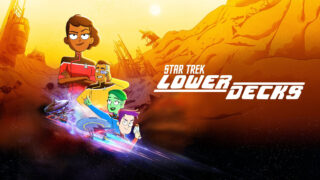
I enjoyed Picard’s optimistic yet pragmatic leadership, Riker’s adventurous loyalty, Data’s android logic and childlike wonder, Worf’s hard Klingon exterior with soft interior, Troi’s human empathy and sympathy for a Betazoid empath, Geordi’s engineering ingenuity despite his personal hard luck, and most if not all of the other recurring supporting characters that are far too numerous to mention.
And the Crushers! I didn’t forget the Crushers, but they do like to come and go, don’t they? Wesley Crusher eventually leaves only to return for a few adventures, and Doctor Beverly Crusher leaves for a season only to return to duty for the rest of the series. In Beverly’s absence we meet Dr. Pulaski who at first I didn’t like at all. But by episode 13 Pulaski grew on me as a female version of Dr. McCoy, but without the country doctor gibes and humor.
It’s important to note that the show changes in tone a bit when Wesley Crusher leaves. In the early seasons, especially in seasons one and two, Wesley is a stand-in for the audience, at times becoming or appearing to become a crutch for the writers. The show moves away from that kind of family programming once he becomes less of a focus for the series.
All of this is to say that I did find the show entertaining and I’m really glad I watched it. I was aware that Star Trek as a franchise had permeated the popular culture, but I didn’t realize how pervasive the TNG references in particular were before I had seen the series. Now I see them everywhere, and for that it was worth it. It feels like graphic design or color theory in that way, because once you learn about it, you see the world through that respective prism. Star Trek in all forms are similar prisms because of just how foundational the franchise and its accompanying fandom are to so much of the media in existence.
Would I like to spend more time in that world? Well, I’m going to either way with the coming movies, but I found myself more curious about how they were going to end the series than actually about what was happening to the characters I have come to know.
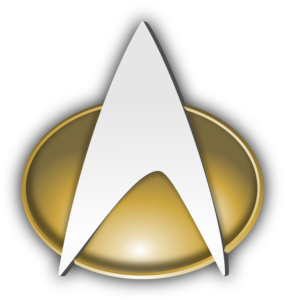
The Cardaissinas never feel like a legitimate threat throughout the series. The threat of war remains as real as any conflict, but as an enemy, the Cardassians never quite measure up to the original threat of the Klingons.
The same is true of the Borg. Sure, Picard gets assimilated, but it’s a machine collective of logic. It never seems as smart or even as logical as Spock, at least in terms of sheer intelligence. And I think that’s a problem for this series. Neither the Borg nor the Cardassians, who are the two large threats for the series, seem to be that worrisome. Even the Romulans only seem threatening but not even as an omnipresent threat like the USSR during the Cold War. It just feels like the threats come and go as the writers chose, and that makes them feel like less of a threat.
For the franchise, the Vulcans felt all but forgotten except for Spock and his father. The Klingon Empire and its accompanying religion were interesting, but the show could have explored so many more religions than just going back to the Worf well and his conflict in being both a Klingon warrior and a federation officer.
I’m not sad that I spent that time watching The Next Generation. I just wish it was more about “boldly going” like the original series was. Maybe that’s the litmus. Perhaps everything will be reductive until it takes a new turn, or perhaps what you experience first is always going to color everything that comes after. Still, I will continue on with the movies of this crew that, in a way, has journeyed a little bit into my heart. It’s not all doom and gloom, but if given the choice, I’ll watch the adventures of NCC-1701 over NCC-1701-D pretty much every time.
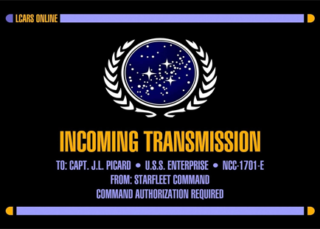
Here’s the bottom line: I fell in love with that original series, but the best I can come up with after thinking about it for a month, is that I like Star Trek: The Next Generation. Maybe that’s enough. Maybe I’ve turned myself into a Star Trek purist, but only time will tell. I do think Picard is the superior captain, but overall, The Next Generation just didn’t capture my heart like the original series.
Live long and prosper, and on to The Next Generation cinematic universe!